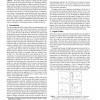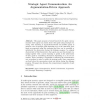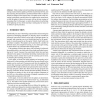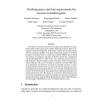109
click to vote
ECAI
2008
Springer
15 years 4 months ago
2008
Springer
Reasoning about perception of depth and about spatial relations between moving physical objects is a challenging problem. We investigate the representation of depth and motion by m...
116
Voted
DALT
2008
Springer
15 years 4 months ago
2008
Springer
Abstract. This paper proposes a formal framework for agent communication where agents can reason about their goals using strategic reasoning. This reasoning is argumentation-based ...
118
Voted
EXACT
2008
15 years 4 months ago
2008
This paper describes a project aiming at enhancing social tagging with reasoning and explanations. So as to keep with the ease of use characteristic of social media, simple explana...
113
click to vote
DLOG
2008
15 years 4 months ago
2008
We identify the complexity of (finite model) reasoning in the DL SROIQ to be N2ExpTime-complete. We also prove that (finite model) reasoning in the DL SR--a fragment of SROIQ witho...
92
Voted
SARA
2000
Springer
15 years 6 months ago
2000
Springer
We investigate the possibility of improving the efficiency of reasoning through structure-based partitioning of logical theories, combined with partitionbased logical reasoning str...
121
click to vote
POPL
2000
ACM
15 years 6 months ago
2000
ACM
with existing analysis tools. Modular reasoning principles such as abstraction, compositional refinement, and assume-guarantee reasoning are well understood for architectural hiera...
139
click to vote
ECAI
2000
Springer
15 years 6 months ago
2000
Springer
Abstract. Representing and reasoning about orientation information is an important aspect of qualitative spatial reasoning. We present a novel approach for dealing with intrinsic o...
117
click to vote
CAEPIA
2003
Springer
15 years 6 months ago
2003
Springer
CBR systems are normally used to assist experts in the resolution of problems. During the last few years, researchers have been working in the development of techniques to automate...
114
Voted
ECAI
2006
Springer
15 years 6 months ago
2006
Springer
Abstract. Most existing work on knowledge representation and reasoning assumes that the updating of beliefs is performed off-line, and that reasoning from the beliefs is performed ...
105
click to vote
ATAL
2006
Springer
15 years 6 months ago
2006
Springer
The effective reasoning capability of an agent can be defined as its capability to infer, within a given space and time bound, facts that are logical consequences of its knowledge...





